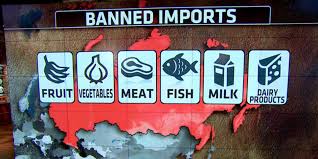The effects of Russia’s Import Ban
The negative effects of Russia’s Import Ban on Irish Food Exports
Russian authorities have recently announced that a ban on certain EU Food Imports will be extended until at least August 2016! This is a significant blow to the Irish Food Sector as Irish Agri-Food exports to Russia amounted to over €213 million in 2013 alone. The main foods affected include: dairy, fish and pig-meat. The figures for the first four months of 2015 show that food exports to Russia amounted to just €15.3 million, which is a drop of 80% from the same period last year.
These bans are as a result of sanctions implemented by the EU on Russia due to the Russian government’s continued support for a so-called proxy war in the Ukraine. With tensions in the region not abating despite several attempted ceasefires, it looks like these bans could be in place for a long time. Russia has increased its economic war on Europe by adding even more countries to the Import banned list. In Russia itself some ministers have admitted that these imposed bans have actually greatly helped their own domestic food industry. But what does this mean for Ireland?
Agricultural Minister Simon Coveney admitted that the Russian import ban has had a significant negative impact on Irish food exports however he was also quick to point out that our food exports to other non-EU countries is on the rise. Exports to Eastern Asian countries increased by 36% and to Gulf States by 39% in 2014 alone. This means that Irish Food producers have a real opportunity to develop their exports to these areas. A major reason for popularity in terms of food exports is our Green Natural Image abroad. Bord Bia implemented a programme called


